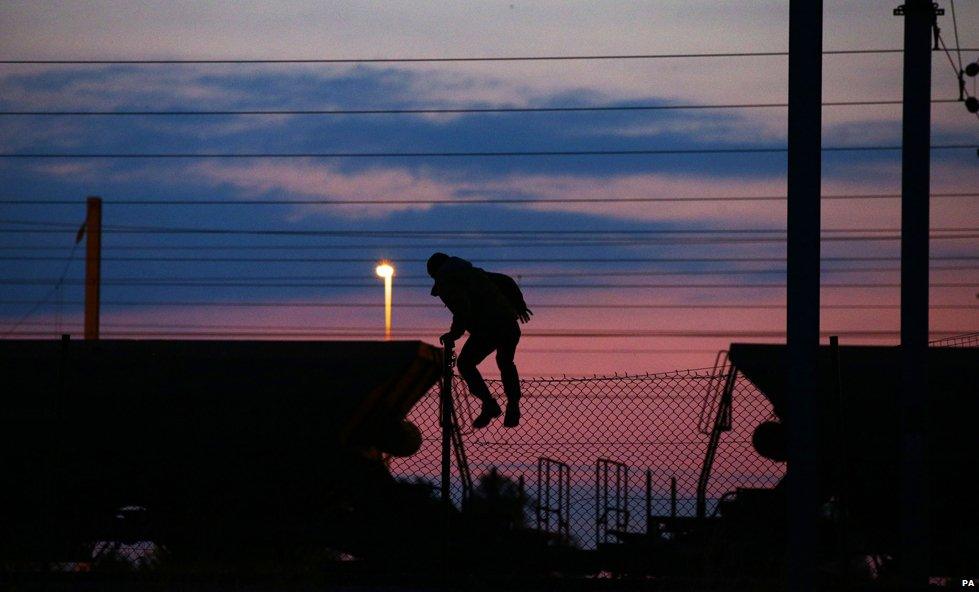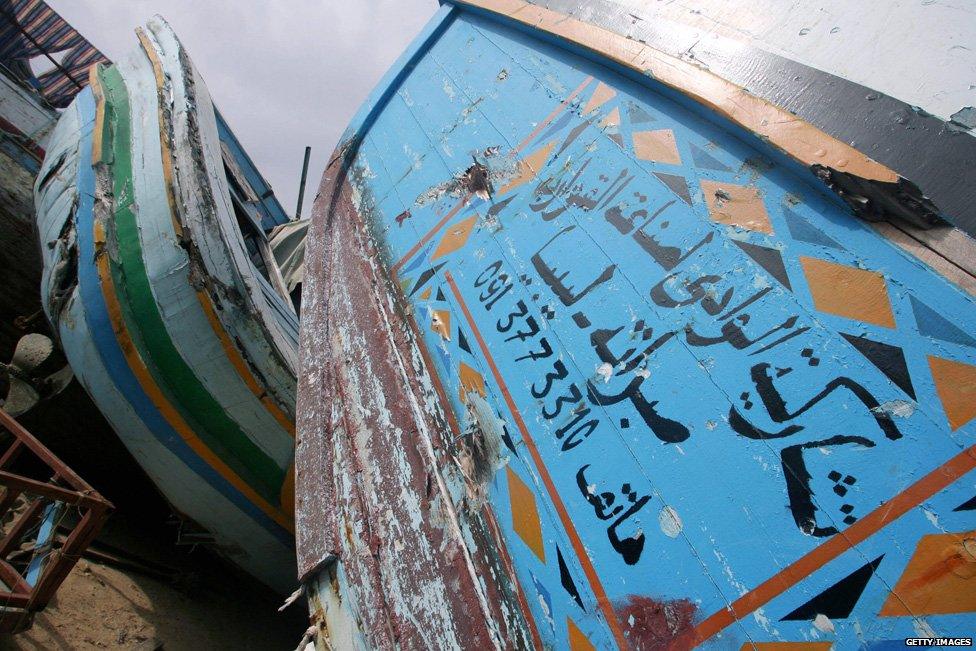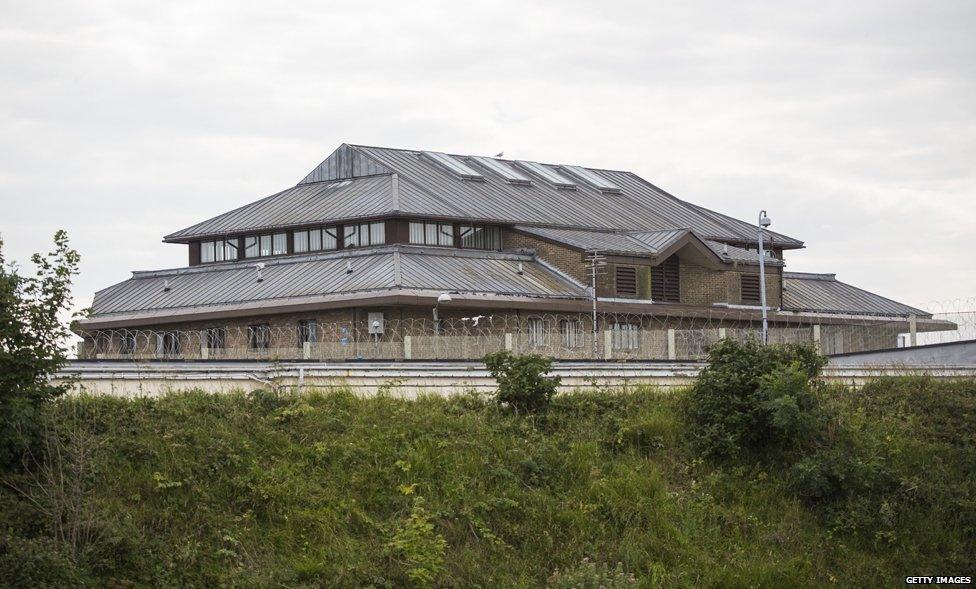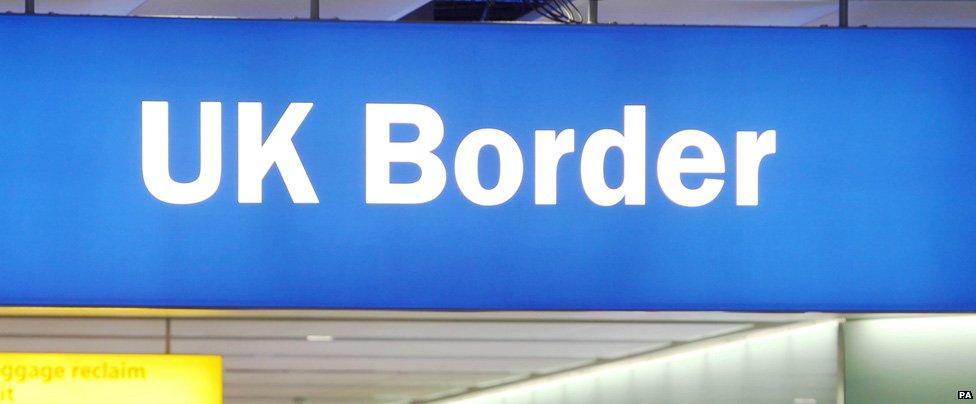What happens to failed asylum seekers?
- Published

Thousands of migrants are camped around Calais in northern France. Many will risk their lives smuggling themselves across the Channel into the UK. What happens to those that get through?
At least nine people have died trying to access the Channel Tunnel since June. Scenes of people climbing over fences and scrambling on to the back of lorries show just how desperate some people are to get to the UK. Last week a man walked most of the tunnel before being caught.
Exactly how many have made into the UK is not yet clear. But for those that have, where will they end up?
Asylum
Some of those who manage to get through will remain hidden and stay as illegal workers. But many of the people waiting in Calais will be expecting to be found and then seek refugee status, external.
Once someone is in the UK, even if they entered it illegally, they have the right to claim asylum. There were 25,020 asylum applications, external in the UK in the 12 months up to March. Police who find asylum seekers will usually hand them over to immigration officials to submit their claim. Asylum seekers are entitled to stay in the UK while they wait for a decision.
But what happens if they have passed through a safe country on their way to the UK?
There is a general principle observed by many countries that asylum seekers who have passed through a safe third country where they could have claimed asylum can be sent back there in order to make their claim.
All of those waiting in Calais to cross the Channel fit into this category. They are in a safe country but few will have reached France without having crossed another EU border beforehand.
The EU has a specific rule about this to try to work out which country is responsible for handling an asylum claim.

Sign for a make-shift 'UK Asylum Workshop' in Calais
Dublin Regulation
The Dublin Regulation allows some asylum seekers to be sent to other EU nations, including France. It sets out criteria for identifying which country should look at a claim.
Usually, the first EU country someone arrives in is responsible for processing their application, external. This is meant to stop "asylum shopping", where one person submits multiple asylum applications in different countries.
The Eurodac system, external can help identify which country was the entry point, explains Alexander Betts, director of the Refugee Studies Centre at the University of Oxford. This is a database of fingerprints of asylum seekers across the EU.
A hit on the system would help prove that an asylum seeker had already been registered in a different EU country and could be sent back there.
The Home Office says that it takes "full advantage" of this rule to send people back to European nations such as France. But the UK only carried out 252 Dublin transfers in 2014, external, compared with 827 in 2013.
And it's complicated because the vast majority of those in France will have passed through at least one other safe country to get there - perhaps Italy or Spain.
Not everyone will have registered with border officials and without documentation it can be hard to prove which countries someone has travelled through. "It's legally and diplomatically complicated," explains Betts, to try moving someone to a place that is not their country of origin.
Some governments have also stopped sending people back to the two of the most likely entry countries for asylum seekers - Greece and Italy, because they are already inundated with asylum applications. In Greece there has been criticism over the treatment of asylum seekers.
"One of the biggest challenges with the Dublin system is that it creates a fundamental inequality, by placing a disproportionate responsibility on frontline states like Greece and Italy," explains Betts.

Fishing boats used by migrants on the Italian island of Lampedusa
Slow process
The fast-track detention system for asylum seekers in the UK has been suspended. The rush to process people in about 22 days was leaving people without enough to time to put together meaningful cases, says Thom Brooks, professor of law and government at Durham University.
The system had aimed to deal with claims with the potential to be processed quickly, especially those from countries that are presumed by the Home Office to produce clearly unfounded asylum claims, external. This list includes countries such as India, Brazil and Bolivia, explains James Conyers, legal officer for Refugee Action.
But in July, the Court of Appeal upheld a suspension ruling which declared the system unfair and "unlawful".
Backlog
There were more than 25,000 asylum applications in the UK in the 12 months up to March. Most applications are typically rejected and in 2014, more than 60% of initial decisions on asylum applications were refusals, external.
But in the same year, only 6,788 asylum seekers and their dependents were removed or departed voluntarily, external from the UK.
Many of last year's removed people could have had their asylum applications refused some time ago. The Home Office will not say what the average time is between asylum refusal and removal from the UK, saying that this does not form part of their routinely published statistics.
It can be hard to keep track of the number of people who are waiting to be removed.
Appeals
Appeals make the average removal delay even harder to measure. "I can't imagine anybody who would apply and then not appeal," says Adrian Berry, chair of the Immigration Law Practitioners' Association (ILPA). Most asylum seekers have a right of appeal if their claim is refused. Many will remain in the UK while they wait for this, although the government has proposed a "deport first, appeal later" policy.
The aim is for all appeals to be heard within two months of the initial decision but there is a significant backlog of cases. At the end of March, 21,651 of the applications for asylum in the UK received since April 2006 were still awaiting, external an initial decision, appeal or further review.
Legal challenges delay removals but Berry says that it's a myth that asylum seekers can endlessly appeal over their asylum claim. Permission can be granted to go beyond the tribunal that hears the first appeal but few people get that, he explains, as there needs to have been an error of law.
The latest figures say that 2,242 appeals have been determined, external in the UK so far this year, with 66% dismissed.

Immigration removal centre in Dover
Undocumented
The biggest cause of delay in removals of failed asylum seekers is bureaucratic, says Jerome Phelps, director of pressure group Detention Action. Many asylum seekers will have fled their countries without a valid travel document. Others may have destroyed their passport before entering the UK and it can be difficult to prove their nationality. Phelps argues that some people in this situation are "effectively unreturnable, external".
"The UK is unique in the EU for having no time limit on detention," he explains, adding that some people in detention are waiting for an emergency travel document that is unlikely ever to come.
Some countries refuse or delay issuing a travel document to returnees who do not have a valid passport. Other nations do not allow the forced return of individuals, or demand proofs of nationality that are almost impossible to meet. How many people are stuck because of problems with their documents is not clear. The Home Office says that this does not form part of their routinely published statistics.
"The UK can want to kick people out and it can be lawfully authorised to do that but it requires the other country to actually want to take people back," says Brooks.
The UK and the EU have readmission agreements, external with certain countries such as Algeria, Afghanistan and Pakistan. These will all affect when and how easy it is to send people back.
Flights

UK border sign at Heathrow Centre
The Home Office removes people on commercial flights or chartered planes. There were nearly 800 chartered flights, external of asylum seekers between 2001 to 2014. But some people are delayed indefinitely because travelling to the country in question has become too dangerous. The Home Office says that it does not publish a list of these countries.
A charter flight which was due to depart for Afghanistan on 21 April carrying dozens of people was stopped by the Court of Appeals because of the worsening security situation.
Return flights can also be suspended when removing someone breaches their human rights. Earlier this year a Nigerian asylum seeker and her son were returned to the UK because the decision to remove them had been made without taking into account the impact on the boy or his mother's mental health problems.
Last minute injunctions can also prevent removals. Judith Dennis, policy manager at the Refugee Council, says that often more people are escorted to the airport from detention centres than there are seats on the plane. If someone is successful in stopping their removal then another person can be substituted for them.
"Frequently, this can then mean people go through the fear and anxiety of being taken to the airport, only to be brought back to the detention centre later in the day," she says.
According to Home Office accounts, the Government spent £1.58m last year on deportation flights, external which were booked before individuals were granted the right to appeal and were then cancelled.
A full breakdown of the costs involved in removing asylum seekers is not in the report. But Berry argues that enforced removal is expensive and that this partly explains why the Home Office wants to create a "hostile environment" so that people who do not have permission to stay in the UK choose to leave voluntarily.
The National Audit Office looked at costs of removing failed asylum seekers in 2005 and found that the average cost of supporting someone to leave voluntarily was £1,000 but that an enforced removal cost £11,000, external.
The Home Office is currently retendering for a contract, external for escorting and travel services for immigration "detainees" within the UK and overseas. The contract also includes managing people in holding rooms and booking flights.
It says the total value of the contract is about £500m and that this includes "travel ticket costs of approximately £200m". But it does not say for how many years that will cover or how many people the contractors will be expected to remove.
Subscribe to the BBC News Magazine's email newsletter, external to get articles sent to your inbox.